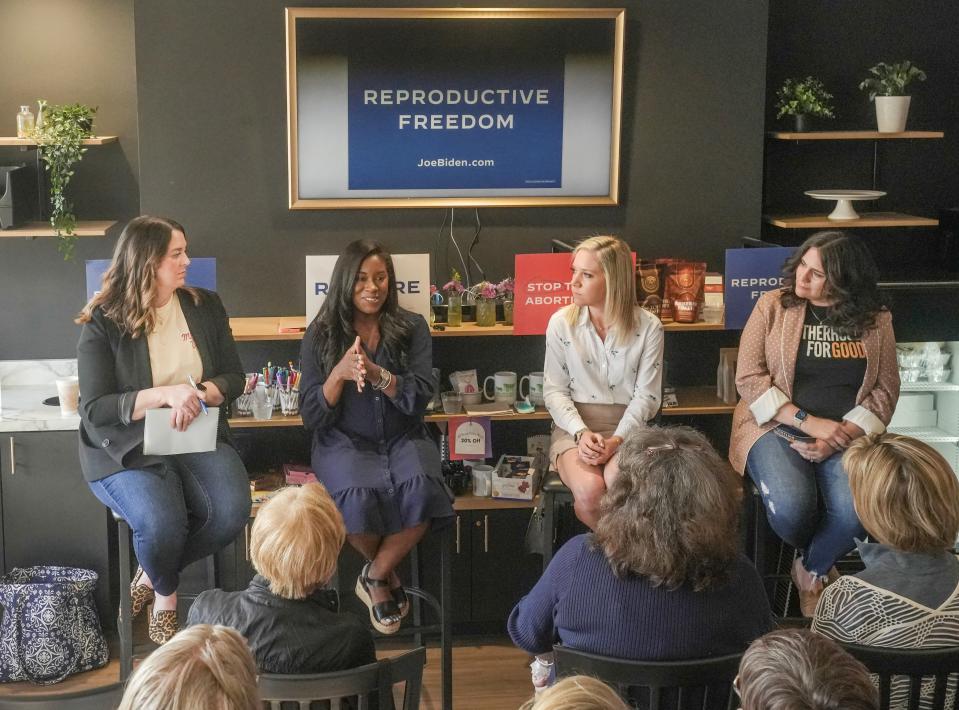Women campaigning for Biden take abortion issue to Republican stronghold Waukesha County
MENOMONEE FALLS ? Tina Kanetzke was surprised when she learned two women who had experienced poor medical care in states with near total abortion bans were traveling to Menomonee Falls to campaign for President Biden.
Kanetzke said voters like her are "still in the minority" in Waukesha County, part of the state's Republican stronghold of three counties that include Ozaukee and Washington and are commonly referred to as the "WOW" counties.
“I think the street would have been filled with protesters had people in town known this was going on,” Kanetzke said.
Instead, Appleton Avenue was free of protesters as a small group of voters gathered at Batter & Mac to hear Kaitlyn Joshua, of Louisiana, and Amanda Zurawski, of Texas, describe how their lives were negatively impacted by the overturning of Roe v. Wade in 2022.
The gathering of mostly women in the northwest Milwaukee suburb is a targeted move by the Biden campaign to reach suburban women, who especially in Waukesha County, have long been a trusted base for the Republican Party.
There are signs that is changing.

According to an analysis by the Journal Sentinel of three Marquette Law School polls over the past nine months, former President Donald Trump is much more popular among Republican voters in the small towns and rural counties of northern and western Wisconsin than he is among Republican voters in the cities and suburbs of metro Milwaukee and Madison.
Across metropolitan Milwaukee and Madison, a large minority in his party (anywhere from 27% to 44%) view Trump negatively. These areas are home to around 40% of self-identified Republicans and Republican-leaning independents in the state. This includes Waukesha County.
"It is not going to be an easy road, but we are seeing inroads and the county is turning more purple," said Danielle Scampini Linn, a resident of Elm Grove. "Year to year it ticks up a little bit. I don't think the demographics are changing. I think the engagement is changing."
A recent Wall Street Journal poll of battleground state voters, including Wisconsin, found 39% of suburban women cite abortion as their make-or-break issue, leading Waukesha County residents like Linn to find even more reason for the county to continue its trend toward residents voting for Democrats.
More: The RNC in Milwaukee is largely led by women. Will the convention messaging help Republicans?
Linn is also a founding member of Motherhood for Good, a liberal organization that helped get the word out about Monday's event. She sees abortion as a make-or-break issue that will drive voter engagement.
"In suburban counties like the WOW counties it will make a difference," Linn said Monday.
Abortion will be the issue that determines how Kanetzke votes in November, too. She said until Roe was overturned, leaving it up to individual states to set abortion laws, she never felt she had to make it her priority issue. Now she does.
Trump campaigned in 2016 with the promise to overturn Roe v. Wade and, once elected, nominated three conservative justices to the U.S. Supreme Court. The Trump campaign released an ad last week in which Trump took credit for overturning Roe v. Wade and said it’s "now up to the states to do the right thing."Trump's statements on abortion have changed multiple times over the years.
Rachel Lee, a spokeswoman with the Republican National Committee, said in a statement to the Journal Sentinel that Trump "could not have been more clear."
"These decisions should be left to the states to determine by vote or legislation or perhaps both," Lee said.
Zurawski and Joshua argue a patchwork of varying abortion laws from state to state is dangerous and provides substandard care for pregnant women.
Those who attendance at Monday's event heard how Joshua, while between 10 and 11 weeks pregnant, was turned away from three medical centers while she was having a miscarriage in Louisiana. She said Monday that doctors were fearful to perform the necessary procedure — a dilation and curettage, or D&C — to end her pregnancy. The procedure is the same as an abortion.
Zurawski learned when she was 18 weeks that her baby girl was not going to survive the pregnancy. Rather than immediately induce her to end the pregnancy, doctors waited three days for her to develop an infection and go into septic shock, a life-threatening condition that allowed doctors to only then perform an abortion to "save the life of the mother"' she said. She was twice placed in the intensive care unit.
She said after she recovered she struggled with saying she had an abortion.
"Now I don't have a problem saying it," she said. "The more we talk, the more we de-stigmatize the word."
Monday's event was the first of four that will be held in Wisconsin this week.
A second Milwaukee event will be held Tuesday with Wisconsin Lt. Gov. Sara Rodriguez, doulas and reproductive rights advocates.
Zurawski and Joshua will then head to Madison for a discussion Tuesday afternoon and to Eau Claire on Wednesday.
Megan Kling of Taylor, a small town near Black River Falls, will be joining Joshua and Zurawski in Eau Claire to tell her story, which she shared with the Journal Sentinel earlier this year.
Locations and times for the events have yet to be released.
Craig Gilbert contributed to this report.
Jessica Van Egeren in the Milwaukee Journal Sentinel's enterprise health reporter. She can be reached at [email protected].
This article originally appeared on Milwaukee Journal Sentinel: Women campaign on abortion for Biden in Wisconsin GOP stronghold
